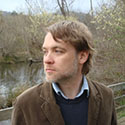The Insensible Power of Nature
Tornadoes and hurricanes inspire physicist Alan Lightman to consider our connection to the natural world
Alan Lightman is the highly acclaimed author of plays, poems, novels, and essays—and he’s working on a memoir about his Memphis childhood—so it is not surprising that the recent run of calamitous weather would inspire him to write a literary meditation on the relationship between human beings and the natural world. But Lightman is also an acclaimed physicist, and any meditation he writes is bound to include as much hard-edged science as speculative rumination.
 For Lightman, theoretical science and spiritual response are not two different realms of experience so much as they are two different expressions of the same humanity. As Maria Browning points out in her Chapter 16 review of The Accidental Universe, Lightman’s new essay collection, “As firmly ensconced as he is in the pro-science camp, he regards spirituality as real and important, and he offers a beautifully rendered account of one of his own transcendent experiences—a close encounter with a pair of young ospreys—which he describes as ‘one of the most profound moments of my life.'”
For Lightman, theoretical science and spiritual response are not two different realms of experience so much as they are two different expressions of the same humanity. As Maria Browning points out in her Chapter 16 review of The Accidental Universe, Lightman’s new essay collection, “As firmly ensconced as he is in the pro-science camp, he regards spirituality as real and important, and he offers a beautifully rendered account of one of his own transcendent experiences—a close encounter with a pair of young ospreys—which he describes as ‘one of the most profound moments of my life.'”
Lightman brings this paired capacity for analysis and empathy to a new essay for The New York Times, in which he grieves for those lost in the recent disasters—”the innocent people drowned or crushed without warning as they slept in their beds, worked in their fields or sat at their office desks”—and recognizes the feeling of betrayal that such disasters inspire in us because we feel so intimately connected to the natural world:
Aren’t we a part of nature, born in nature, sustained by the food brought forth by nature, warmed by the natural sun? Don’t we have a deep spiritual connection with the wind and the water and the land that Emerson and Wordsworth so lovingly described, that Turner and Constable painted in scenes of serenity and grandeur? How could Mother Nature do this to us, her children?
The answer, of course, is that Nature does not regard us as her children—that, in fact, nature doesn’t regard us at all:
Nature is neither friend nor foe, neither malevolent nor benevolent. Nature is purposeless. Nature simply is. We may find nature beautiful or terrible, but those feelings are human constructions. Such utter and complete mindlessness is hard for us to accept. We feel such a strong connection to nature. But the relationship between nature and us is one-sided. There is no reciprocity. There is no mind on the other side of the wall.
According to Lightman, the implications of this cosmic indifference are important only to us: the climate debate is not important as a relative measure of the planet’s health; ultimately nature will survive anything we can subject it to. But it’s up to us to preserve ourselves from what might happen next.
Read the full essay here. See Alan Lightman’s recent TED Talk here.
For more updates on Tennessee authors, please visit Chapter 16’s News & Notes page, here.
